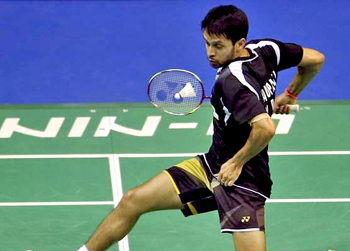Singapore, Apr 12: If you had watched Parupalli Kashyap go down to Hu Yun 20-22, 21-11, 21-14 in the semifinals of the Singapore Open Super Series, you would know that two players grievously and equally prone to errors are as likely to produce an entertaining match, as two who can impress with impeccable perfection.
 A nervy Kashyap, started all guns blazing — and misfired several smashes, punctuating that error-strewn display which cost him the match with some delectable cross-court strokes. A back-hand reverse slice from mid-court at 13-7 in the opener was beautifully executed — restrained grip on the racquet and making the shuttle pause in the air a second before snapping. A lot of the fancy wrist-work didn’t come through as he would have liked though — and he paid the price with easy points gifted to his opponent from Hong Kong — with the match ending in a messy puddle of missed chances for India’s most graceful shuttler.
A nervy Kashyap, started all guns blazing — and misfired several smashes, punctuating that error-strewn display which cost him the match with some delectable cross-court strokes. A back-hand reverse slice from mid-court at 13-7 in the opener was beautifully executed — restrained grip on the racquet and making the shuttle pause in the air a second before snapping. A lot of the fancy wrist-work didn’t come through as he would have liked though — and he paid the price with easy points gifted to his opponent from Hong Kong — with the match ending in a messy puddle of missed chances for India’s most graceful shuttler.
But it was Hu Yun, a 33-year-old with a dash of Taufik Hidayat’s magical overhead deception but none of his success in terms of World or Olympic titles, who turned the match into one right contest, pumping fists after playing some outrageous angles. The former Top-5 player has never won a Super Series title — like Kashyap — which is down to his inconsistency that was abundantly visible at the start of the match. But Yun would get the better of the Indian at the net exchanges and rub in his deceptive prowess even as Kashyap made a mash of shuttles hit onto an open court.
A dozen times, Kashyap’s gentle pushes would ill-judgingly fall limp at the net, and his smashes sputtered wide and long as he struggled to control the shuttle. Yun, with his lazy gait, would test the younger player’s patience slowing down the pace of rallies to such a crawl that annoyed the Indian even more. The first point of the second set was a long-drawn rally — not with very many shots back and forth — but with Yun toying with the shuttle, picking it a second late, and placing it with all the time to spare to decelerate the speed of the strokes.
Kashyap, who had started with all-out aggression and as such held the smash as his finishing weapon, couldn’t force the pace — or conceded advantage through unforced errors. In the opener, Yun had made up an 8-point deficit to come from 5-13 down to levelling at 19-all. But after the Indian hung on to win the opener, Yun would turn it around and revel in his dominance and celebrate with the trademark East Asian celebration of a long, hissing “Sa”, popular amongst the Koreans.
Still, the Hong Kong veteran would continue with some barmy bungling of his own, wasting straight kills, but he had Kashyap stewing in the slow simmer pace of the game that followed. The Indian would struggle to keep it together, and fail to stay compact. In the dying stages of the match, an iffy line-call would go unchallenged by Yun who opted to stick by the linesman’s verdict. Kashyap, perhaps bothered by the drift, would follow it up with a smash-error immediately after.
Two high quality stroke-makers contrived to accumulate errors that were completely anathema to their own talent. Hu Yun, who’s beaten Chen Long this week and hit the form of his life, conjured a chance out of that bloodbath of blundering to put himself in contention for a Super Series title, though his opponent tomorrow, Kento Momota might not be as kind to him, by being error-prone.





Comments
Add new comment